
The Free Press

The best way to keep up with our Olympics coverage is by subscribing to the Front Page. There, you’ll get Free Press intern and Olympic correspondent Evan Gardner’s reports of the games, and you’ll also receive the best from The Free Press—the news we’re reading and deeper dives into the biggest issues of the day, straight to your inbox. Subscribe to the Front Page here:
You can read all our ongoing coverage of the Olympic games below.
August 12
→ Madeleine Kearns: The cloud over Olympic boxing. Two boxers deemed ineligible to compete in the 2023 women’s world championships are leaving the Paris Olympics with gold medals.
Algeria’s Imane Khelif beat the reigning 66 kg world champion Yang Liu of China on Friday. Taiwan’s Lin Yu-Ting bested Poland’s Julia Szeremeta in the 57 kg final the following day.
Khelif and Lin both have XY chromosomes, according to the International Boxing Association, which disqualified them last year.
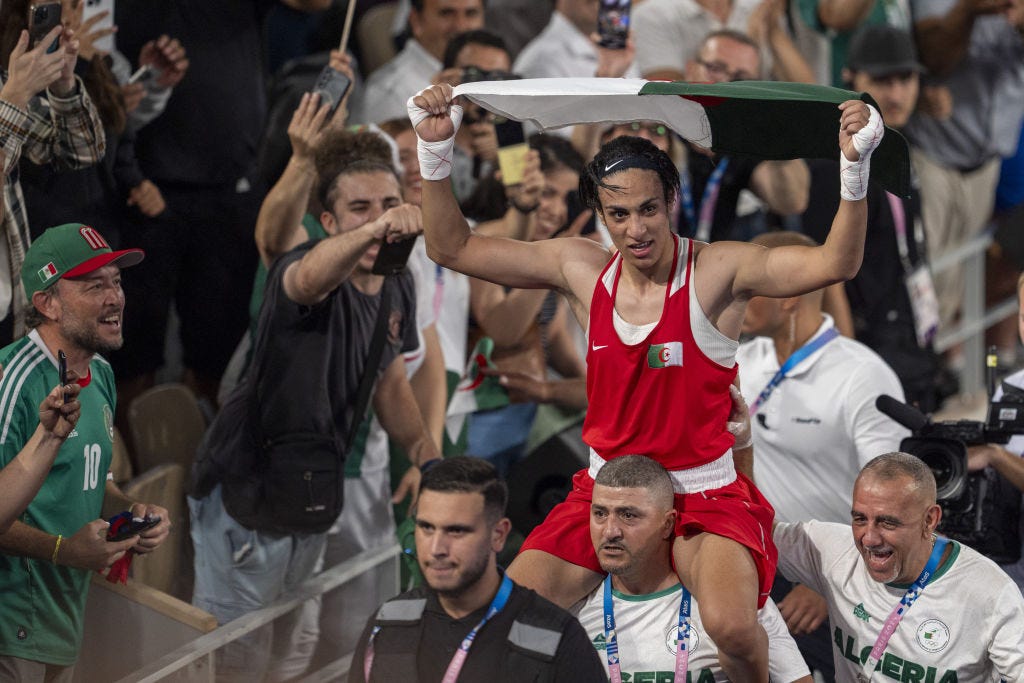
Their participation sparked outrage. An Italian competitor withdrew from her fight against Khelif after only 46 seconds, exclaiming, “It’s not fair!” Two of Lin’s competitors made a double X sign with their fingers—a nod to their chromosomes—after being defeated. As the controversy has intensified, the IOC has done nothing to reassure those concerned about fairness and safety. Instead of offering new information or test results, the body has stuck to an unconvincing script:
“We have two boxers who are born as women, who have been raised as women, who have a passport as a woman, and who have competed for many years as women, and this is the clear definition of a woman,” Thomas Bach, IOC president, said at an August 3 press conference. In other words, nothing to see here.
But it seems there is more to the story. Many experts consider it likely that the pair have disorders of sex development (DSDs)—conditions that disrupt the normal development of reproductive organs and genitals.
To understand the science at the heart of the controversy, I spoke to Carole Hooven, PhD, human evolutionary biologist and author of T: The Story of Testosterone, the Hormone That Dominates and Divides Us.
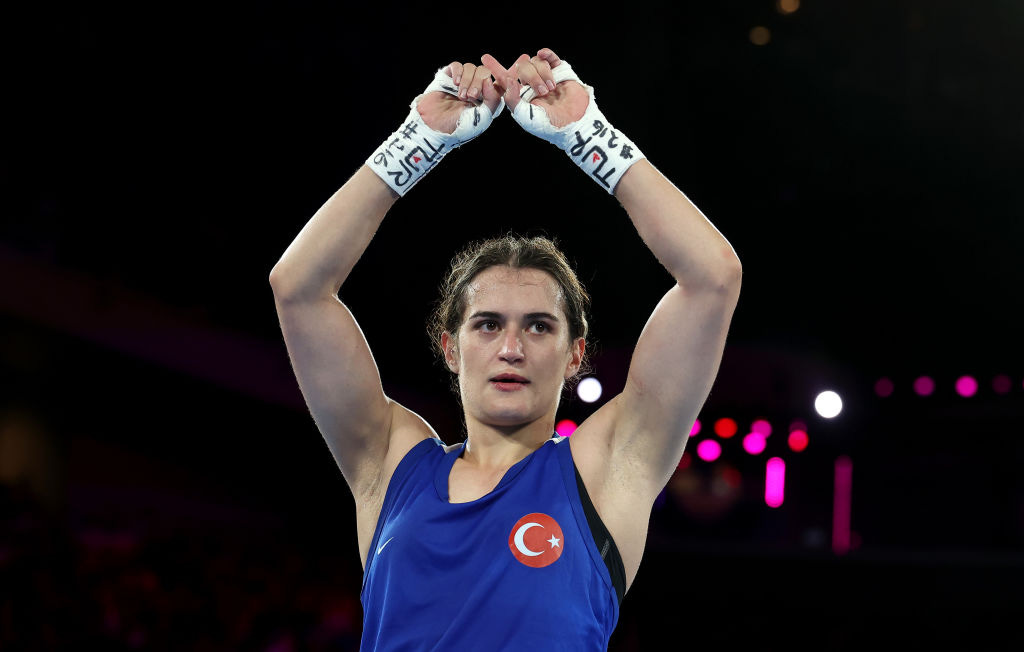
Chromosomes “determine but do not define sex in mammals,” she said. “What gives males—who typically have XY chromosomes—an advantage over females in elite sports are the beneficial effects of high levels of testosterone across development.” That “is why we have separate sporting categories for females.”
There are some rare disorders (or differences) of sex development in which “people with XY chromosomes lack testes and therefore, also lack the high levels of testosterone that would provide that advantage,” says Hooven. “In those cases, there’s probably no reason to exclude those people from the female category.” There are also conditions in which “a person with XY chromosomes has testosterone-producing testes, but the body is not able to fully respond to that testosterone.” The IOC didn’t make public any data on the two gold medalists’ testosterone levels, and suggested they hadn’t tested them.
One DSD condition that appears to be over-represented in people competing in the female category is “five-alpha reductase deficiency,” or 5-αRD, in which an XY male cannot make DHT, the hormone that “masculinizes the male genitalia in early development.” Without DHT, “the person’s external genitalia can appear female,” and so they may be registered as female at birth. People with 5-αRD have “testosterone-producing testes, which may be internal prior to puberty.” Then at puberty, the testosterone levels rise, and those individuals develop “male-typical characteristics, like enhanced musculature and bigger heart, lungs, and all the benefits of testosterone on size, strength, speed, and power.”
One famous 5αRD athlete is Caster Semenya, the South African track champion. World Athletics rendered Semenya ineligible to compete in the female category in 2019, which the Swiss Supreme Court later upheld ahead of the Tokyo Olympics.
“The sensible way for sporting bodies to ensure fairness would be to test for the presence of the Y chromosome in athletes competing in the female category,” says Hooven. “In cases in which the XY chromosomes are discovered, further examination would be required, including determining the presence of testes, and an evaluation of the extent to which the body is able to produce and respond to testosterone.” —Madeleine Kearns
→ Eli Lake: America deserves a star-spangled banger. Over the last three weeks at the Paris Olympics, “The Star Spangled Banner” was played 40 times, once for every gold we’ve won. Our athletes have scored more medals than any other country, but when it comes to the music that celebrates those champions, we’re a long way from the podium.
When it comes to national anthems, I can’t help being jealous of the French, with their defiant hymn, “La Marseillaise.” Best captured in the scene from Casablanca where a group of casino patrons rise to sing it, drowning out the Nazi officers in their midst, the song is a rousing retort to tyranny. “O Canada,” the anthem of our northern neighbor, is majestic and polite, much like the land of maple syrup itself. And even Russia’s national number manages to convey dignity, tragedy, and greatness.
But America? We honor the world’s oldest republic with a song about a tattered flag that’s “still there” after Baltimore was nearly destroyed in the War of 1812. The tune itself is awkward, slow, and ponderous. The verses are halting, borrowing English vernacular that feels ornate in the twenty-first century. “Oh say can you see,” for example, should just be “Look!” And the melody, penned by British composer John Stafford Smith, was once the preferred jingle for an eighteenth-century London gentleman’s club known as the Anacreontic Society, which met once a month to get sloshed and sing.
In short, America rocks—so why doesn’t “The Star Spangled Banner”? I propose a Kamala-Biden style switcheroo for our national anthem. —Eli Lake
Click here to find out which songs Eli thinks should replace “The Star Spangled Banner.”
→ Evan Gardner: Team USA ends on a high, Paris ends with cringe. The final weekend of the Olympics started off rough for the U.S. on Thursday afternoon. Our star sprinter Noah Lyles finished third in the men's 200 m, collapsing into a wheelchair after a case of Covid slowed him down. On Friday, the American men were disqualified after fumbling the baton in the 4 x 100 m relay. This has happened only eleven times in the past nineteen years. Then, on Saturday, we learned that American gymnast Jordan Chiles had her bronze medal revoked after Romania challenged her score.
But despite those initial heartbreaks, Team USA ended the games with a gold rush. The women’s soccer team took gold Saturday, defeating Brazil 1–0. The men’s basketball team, propelled by a magnificent performance from sharpshooter Steph Curry, defeated France 98–87 to win their fifth straight gold. Finally, on Sunday morning, the women’s basketball team sent the host nation packing all over again, winning their eighth straight gold by a single point. The final push was enough to earn the U.S. the top spot in the medal table (tied with China for golds, but winning the most hardware overall) for the Paris Games.

Then, on Sunday, the games came to a close the same way they started: a whole lot of lights, a whole lot of fire, and a whole lot of cringe. After a wholesome karaoke session by athletes from 206 nations, things went sideways as we entered the theater portion of the closing ceremonies. The theme was “rediscovery.” The performance was set in a dystopian future, where the Golden Voyager—a bedazzled, bug-like Spartacus that dropped in from the ceiling—had to rediscover and rebuild the Olympics, one painstaking (for him, and for us) ring at a time. The stage was filled with backflips, flash mobs, and wiry skinsuits. It was, to use the word of the week, weird.
But just when we’d lost all hope, in came our handsome savior: Tom Cruise rappelled from the rooftop, seized the Olympic flag, and brought it back to Los Angeles on the back of his shiny motorcycle. Back on the beach of L.A., we got concerts from the Red Hot Chili Peppers, Billie Eilish crooning her hit “Birds of a Feather,” and Snoop Dogg (one of NBC’s stars of this Olympics) rapping “Drop It Like It’s Hot.”

With that, it was official: Paris ’24 was out, L.A. ’28 was in. Cringe was replaced by cool. Or, at least, by what’s cool now. Who knows what 2028 will bring? Hopefully by then we’ll get our baton-passing down pat. —Evan Gardner (Read our full coverage of the Olympics here.)
August 8
→ Name games: Comedian Tim Dillon has one major gripe against the Olympics: the names just aren’t cool enough anymore. In the days of Picabo Street, he found himself glued to the television. Nowadays, he questions whether “adults even watch the Olympics anymore.”
There’s good news this year for fans like Tim: unbelievable names are back. In dressage—that’s the one where the horse dances—there’s Jagerbomb, a 10-year-old horse who weighs in at 1,600 pounds, who performs to “Sex Bomb” by Tom Jones. In table tennis, the bronze went to a Frenchman named Lebrun; who knew LeBron could be translated! I’ve even become a fan of Norwegian swimming because of the Muffin Man, a 27-year-old viral phenomenon named Henrik Christiansen who hoards chocolate muffins in his bedroom to hit his daily goal of 7,000 calories.
And then there’s the king of names: Armand “Mondo” Duplantis, the Louisiana-born pole vaulter competing for Sweden has been deemed the Timothée Chalamet of track and field—a heartthrob with a mop of hair and a very tall pole. But Duplantis is more than just an awesome name and a pretty face. On Monday night, he won the gold medal in his sport, breaking the world record for the ninth time in his career. In other words: if you look up the top 10 pole vaulters, he’s nine of them. After making history again, the pole vault playboy sprinted straight to kiss his model girlfriend, and partied so hard that he showed up to his interview the next morning visibly hungover. We salute Mondo Duplantis. We just wish he competed for his home country.
What to watch today: At 2:30 p.m., Noah Lyles faces off against his countryman “Kung Fu” Kenny Bednarek in the 200-meter final. At 3:00 p.m., the U.S. has a rematch against Serbia for the men’s basketball semifinal. And at 3:25 p.m., Sydney McLaughlin-Levrone meets reigning world champion Femke Bol in a highly anticipated women’s 400-meter hurdle final. —Evan Gardner
August 7
→ The ‘GEN Z 3’ goes for gold: Cast your mind back to the golden age of U.S. women’s soccer, the era of Megan Rapinoe. In 2012, they won gold in London. In 2015, they won the World Cup in Canada. In 2019, they won it again in France. By the end of the 2010s, the U.S. women’s team held the record for most women’s World Cup titles of all time.
And it wasn’t just the wins that made them so compelling—it was the personalities. There was Hope Solo, the troubled goalie playing for redemption; there was forward Alex Morgan, the team’s golden girl; and there was Rapinoe, an outspoken and provocative winger with a pink pixie cut. Even if you didn’t know their games, you knew their faces.
But then everything changed. By 2023, all but Morgan were gone, and the U.S. finished with their worst World Cup performance in history, losing to Sweden in the round of 16. A few months later, a new coach, Emma Hayes took over and cut Morgan from the squad. All of which is to say, the group that showed up to Paris looked nothing like the team we came to know and love.
Until, that is, we met the “Gen Z 3”—also known as the “trident”—the American frontline of Trinity Rodman, 22; Sophia Smith, 23; and Mallory Swanson, 26. The trio took over this year’s Olympics, scoring 9 of the team’s 11 goals (3 each!), leading the team into yesterday’s semifinal against Germany. The Germans proved tough. The match was scoreless until the 95th minute, but, in the first period of extra time, Smith poked in the winning goal, sending the Americans into Saturday’s gold medal match—right back where we belong.
Saturday’s match against Brazil will no doubt be a tough one, but if the new blood can keep up the killer offense, the gold for women’s soccer is, once again, within reach.
What to watch today: At 10 a.m. EST, the U.S. takes on Poland in the men’s volleyball semifinal; at 2:10 p.m., Noah Lyles inches closer to a double gold in the 200-meter semifinal; and at 3:30 p.m., the U.S. women’s basketball team plays their quarterfinal against Nigeria. —Evan Gardner
August 6
→ Medal meddling: By now you’ve heard all about the legendary runs from American gymnasts Simone Biles and Suni Lee in Paris—but while they were stumbling on the balance beam, another American finally got her chance to shine. In yesterday’s floor competition, Jordan Chiles earned her first individual medal and brought the U.S. yet another bronze for her floor routine. But Chiles’ path to victory was anything but smooth. Her initial score landed her in fifth place, but after a nail-biting appeal, she was awarded an extra one-tenth of a point, moving her onto the podium and into a puddle of happy tears.
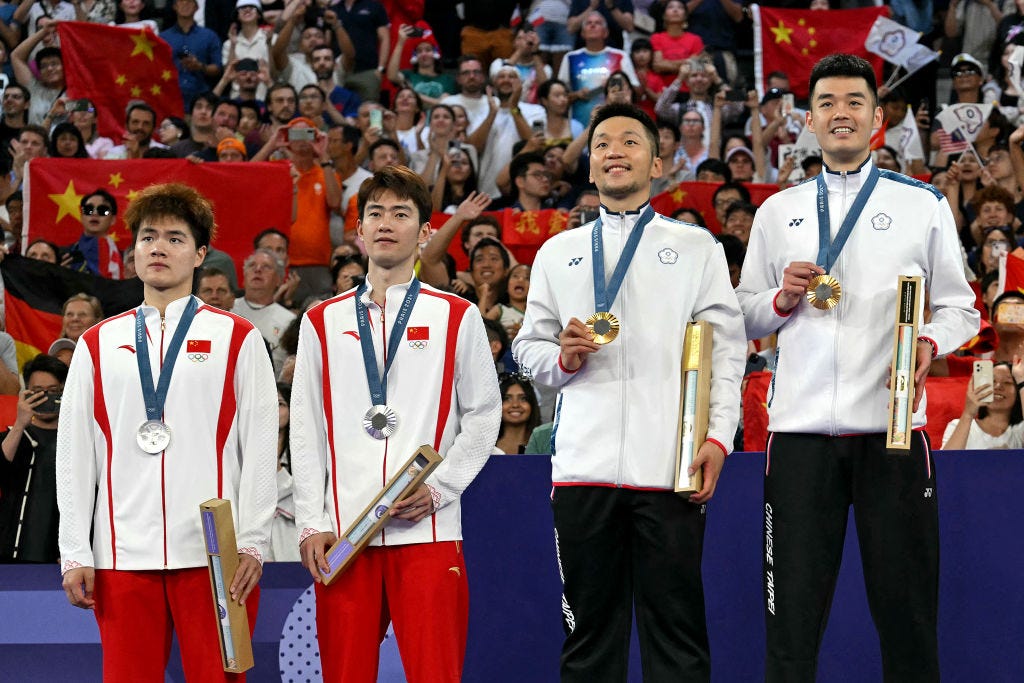
At the same time, there was medal censorship afoot on the badminton court. In the men’s final yesterday, Taiwan’s Lee Yang and Wang Chi-lin triumphed over China’s top-ranked team to earn gold; but the second the match concluded, China’s state-run CCTV cut the feed, effectively pretending that the victory didn’t exist. No medal ceremony or postgame press conference was broadcast, just a memory-holed match, taking the term “sore loser” to a new level. Meanwhile, in the stands in Paris, fans holding banners in support of Taiwan had them confiscated by stadium security or ripped up by other spectators. Who knew badminton could be so dramatic? Watch Taiwan celebrate their victory here.
What to watch today: It’s a big day for team sports in Paris. At 12 p.m., watch the undefeated U.S. women’s soccer team take on Germany in their semifinal. And at 4 p.m., the Americans meet the Germans in the women’s beach volleyball quarterfinal. —Evan Gardner
August 5
→ Meet your new fastest man in the world: It came down to five-thousandths of a second, but he did it. Noah Lyles, the 27-year-old American sprinter, won the 100 meter dash, beating out Jamaica’s Kishane Thompson for the gold and the title of “Fastest Man in the World.” The gold hasn’t gone to an American since 2004.
Lyles is hard to miss. Most athletes show up to race in an Adidas sweatsuit; he arrived at the Olympic team trials in a Gucci suit made in collaboration with Adidas, as Snoop Dogg carried his uniform and a bunch of Yu-Gi-Oh! cards in a silver briefcase. He wears a flashy chain and nail polish, and says in interviews that he’s working to “transcend” the sport. Oh, and he has a tattoo on his abs that reads “icon.”
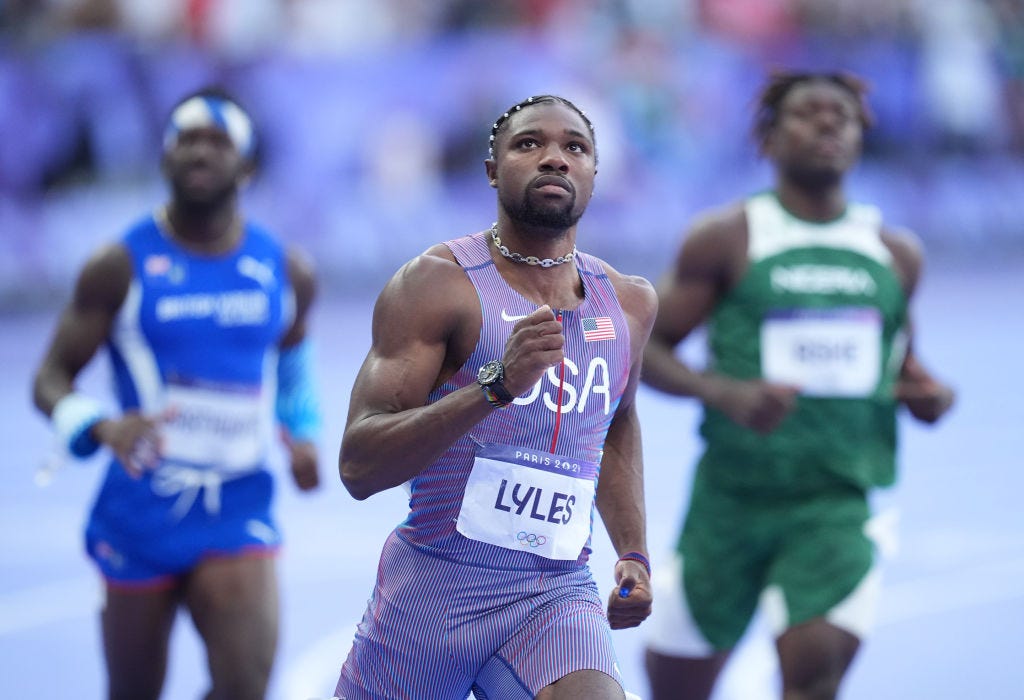
None of this spells subtlety, but at Sunday’s race, Lyles put his money where his legs are. He finished the contest with a time of 9.79 seconds. He’s also expected to take gold in the men’s 200 meter race this Thursday.
But it wasn’t all star-spangled banners for American sprinters this weekend. After a 2021 THC suspension barred her from Tokyo’s games, Sha’Carri Richardson broke the women’s 100 record at 2023’s World Championships, sending her to Paris—and giving her momentum to go with her vendetta. But despite being the favorite for Saturday’s 100 meter final, the Texan track star fell short of her Olympic redemption, finishing second behind Julien Alfred of St. Lucia. Richardson will still have a shot at gold in the women’s relay, and something tells me we’ll be seeing more of her in Los Angeles in 2028. Richardson’s silver and Lyles’s gold added to a big medal haul for Team USA over the weekend. We’re now where we belong: at the top of the table.
What to watch today: This morning Simone Biles will compete in her final two medal events: catch her on the beam at 6:35 ET, and in the floor final at 8:20. And if you’re looking for something to read between matchups, check out The Wall Street Journal on why the New York Knicks and France’s national team suffer from the same Les Blues on the basketball court. —Evan Gardner
August 1
→ Is surfing the sleeper sport of the Olympics? On Tuesday, just hours before start time, officials postponed the men’s triathlon due to those pesky E. coli levels in the Seine. But by Wednesday morning the athletes were off, fighting through water that, according to a WSJ report, “didn’t taste great” and looked “a little bit brown.” The event ended with Tyler Mislawchuk of Canada vomiting all over the finish line, whether because of exhaustion or the murky Seine is anyone’s guess. And the water isn’t the only contaminated substance haunting this year’s Olympics. Tang Muhan, a swimmer for China’s women’s team competing for gold, tested positive for steroids in 2022; Chinese investigators cleared her for Paris by blaming the result on some tainted burgers. Don’t eat the burgers in China unless you want to PR!
With swimming mired in scandal, a new frontier of aquatic excitement has emerged: the surfing in Tahiti. Tune in to the competition there and you’ll find Saturday Night Live’s Colin Jost reporting barefoot from white sand beaches and flaunting his Hawaiian shirt collection under a blazer. Plus some of the world’s coolest athletes showing off their death-defying tricks. My favorite is Brazil’s Gabriel Medina, whose majestic pose makes it look like he’s flying; you can watch him compete in the sport’s closing events today. New York magazine warns that the Tahitian waves are dangerous. I say: a small and gnarly price to pay for an epic barrel shot that’ll last a lifetime.
→ Is the Olympics allowing male boxers to fight women?: Today and tomorrow at the Olympics, two athletes who are reportedly male will fight in two different women’s championships. Yep, you read that right.
The two boxers are Algeria’s Imane Khelif, competing in the 66 kg category, and Lin Yu-Ting of Taiwan, competing in the 57 kg category.
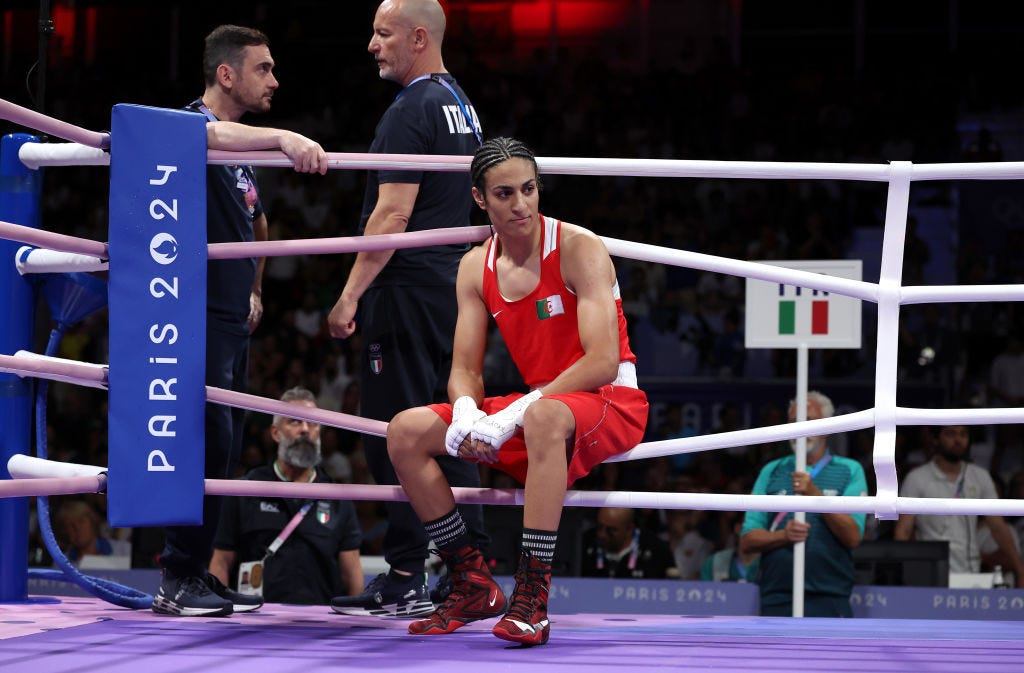
Last year, Khelif and Yu-Ting were disqualified from the 2023 Women’s World Boxing Championships after the president of the International Boxing Association (IBA) said that DNA tests “proved they had XY chromosomes.”
But the International Olympics Committee has given the boxers the go-ahead.
When pressed, the IOC spokesman explained that “everyone competing in the women’s category is complying with the competition eligibility rules.” Those eligibility rules are “incredibly complex,” he added, rather unhelpfully.
What he didn’t say: the IOC’s rules appear to be colored by gender ideology. According to the body’s “Portrayal Guidelines” for members of the media, the terms biologically male and biologically female are “problematic,” and “a person’s sex category is not assigned based on genetics alone.”
In 2023, the president of the International Boxing Association announced that “a series of DNA tests” had “uncovered athletes who were trying to fool their colleagues and pretended to be women.” Speaking to an Algerian TV network, Khelif rejected the IBA disqualification as a “big conspiracy.” Despite speculation, neither Khelif nor Yu-Ting has claimed transgender status or a disorder of sex development (DSD)—medical conditions in which reproductive organs and genitals develop abnormally.
Regardless of their reasons for letting men into the ring with women, critics say the IOC is putting female athletes in danger. “Males—however they identify—pack a punch that is 162 percent more powerful than women—THE biggest performance gap between men and women,” Nancy Hogshead, an American Olympic gold medalist, posted on X. “Gender ideology will get women KILLED.”
One female boxer, Brianda Tamara, recalls how difficult it was fighting with Khelif in a previous tournament. “Her blows hurt me a lot, I don’t think I had ever felt like that in my 13 years as a boxer, nor in my sparring with men,” Tamara wrote on X. “Thank God that day I got out of the ring safely.”
Asked about Khelif and Yu-Ting’s participation in the Olympics, Mark Adams, the IOC spokesman, said at a press conference, “I am not going to comment on individuals.” Then he went on to comment on individuals, saying: “They are women in their passports and it is stated that is the case.”
No matter what their passports say, if the athletes have XY chromosomes “that means they’re male and they have no business competing in the women’s category,” Kara Dansky, feminist, lawyer, and author of The Reckoning: How the Democrats and the Left Betrayed Women and Girls tells The Free Press.
“This is nothing other than male violence against women for sport and entertainment,” she says. It’s also bloody unfair. —Madeleine Kearns
→ Why ping-pong is the worst Olympic sport: Amid the drama and excitement of the Olympics, an unfortunate truth emerges: there are sports that are fun to play, and sports that are fun to watch, and the Venn diagram of these two things is by no means a circle.
There’s a certain alchemy to a good spectator sport; multiple elements balance to create both spectacle and drama. The gameplay should be fast-paced and dramatic and not bogged down by endless time-outs and foul calls (I’m looking at you, NFL) or inexplicable delays between plays (that’s you, Major League Baseball). The athletes should be, well, athletic, but in a way that’s relatable rather than freakish—which is why college basketball will always be objectively more fun to watch than the NBA, in which players are so ludicrously tall that they make dunking look too easy.
And then there’s the ball, which should be big and brightly colored enough to see at a distance. Which brings me to Olympic table tennis, a thing I earnestly attempted to watch for thirty whole minutes this week before quitting in a fit of pique. This is not a spectator sport; in fact, I suspect it was designed in a lab to be the antithesis of one. The gameplay was too fast-paced, to the extent it was physically stressful to watch, while also being completely inscrutable. Entire matches began and ended without me ever actually seeing the ball, or even knowing who was hitting it. It was like watching two cats fighting over a dust mote, except less cute and without the occasional time-out for the players to lick themselves.
I was bewildered. Who was watching this? Who was enjoying this?
I called up Paul Thacker, a journalist who claims to like the spectacle of professional ping-pong. He credits a stint in the U.S. Army, where table tennis was one of the few recreational activities available on base: “Having played it,” he said, “when you see someone doing it at such a high level, it’s just like, wow.”
Hearing this, I thought that maybe Thacker’s ping-pong experience meant he literally saw the game itself in a way I couldn’t. But when I asked if he could understand the gameplay or even see the ball, he said no. Apparently, this is part of the appeal. “It’s just the amazing ability they have to catch that ball, when it’s going so fast that you can’t even tell what’s happening,” he said.
He also said he had recently started playing ping-pong again for the first time in many years, and that “I beat an eleven-year-old and I felt very good about myself.”
So, there you have it. I leave it to you, the Free Press readership, to decide who is right about Olympic ping-pong: me, or a man who literally delights in crushing the dreams of children. (Just kidding: we thank Paul for his service, and are sure that the tween had it coming.) —Kat Rosenfield
What Olympic sport do you think makes for a terrible spectacle? Tell us by writing to letters@thefp.com.
What to watch at the Olympics today: At 12:15 p.m. ET, tune in to watch a historic women’s gymnastics all-around individual final. The electric matchup will pit defending champion Suni Lee against her teammate, the all-time great Simone Biles.
July 31
→ Simone Biles leads the “redemption tour”: In 2021, the U.S. women’s gymnastics team tragically fell short of the gold after Simone Biles sidelined herself because of a case of the twisties. It’s a silly name for a serious problem—check out my colleague Francesca Block’s dispatch on the dangers of gymnastics. But this year Biles and co. have righted themselves and won big.
The team called Paris 2024 their “redemption tour,” and oh, what sweet redemption it is. At yesterday’s team finals, Biles became the most decorated American gymnast in Olympic history while leading her squad to a hard-earned gold medal. After her win she said, “I’m doing what I love and enjoying it, that’s all that matters to me.”
But it’s not over for the gymnast G.O.A.T: she’ll have the chance to compete for another, individual gold medal in the individual all-around tomorrow.
The women aren’t the only ones on an epic gymnastics run. The U.S. men’s team earned their first medal since 2008, a bronze, and they had a ball doing it. Their secret weapon was Steven Nedoroscik, better known as “pommel horse guy,” who has become an American legend overnight.
What to watch today: Just after 3 p.m., Katy Ledecky will compete in the 1500 meter freestyle—her signature event. If she medals in that event and one more (she already picked up a bronze in the 400 meter freestyle), she will be the most decorated female swimmer of all time.
July 30
→ On a roll: After winning gold in women’s street skating Sunday, Japan just keeps rolling its competition: Monday morning, the skater Yuto Horigome cruised to his second straight gold; here he is winning Tokyo in 2021. Just a couple hours later, Japan also won gold in men’s team gymnastics. The U.S. won bronze in that event, breaking a 16-year drought on the men’s side. But Japan’s day of dominance came to a close with a crushing defeat in women’s basketball, falling to the Americans 102–76.
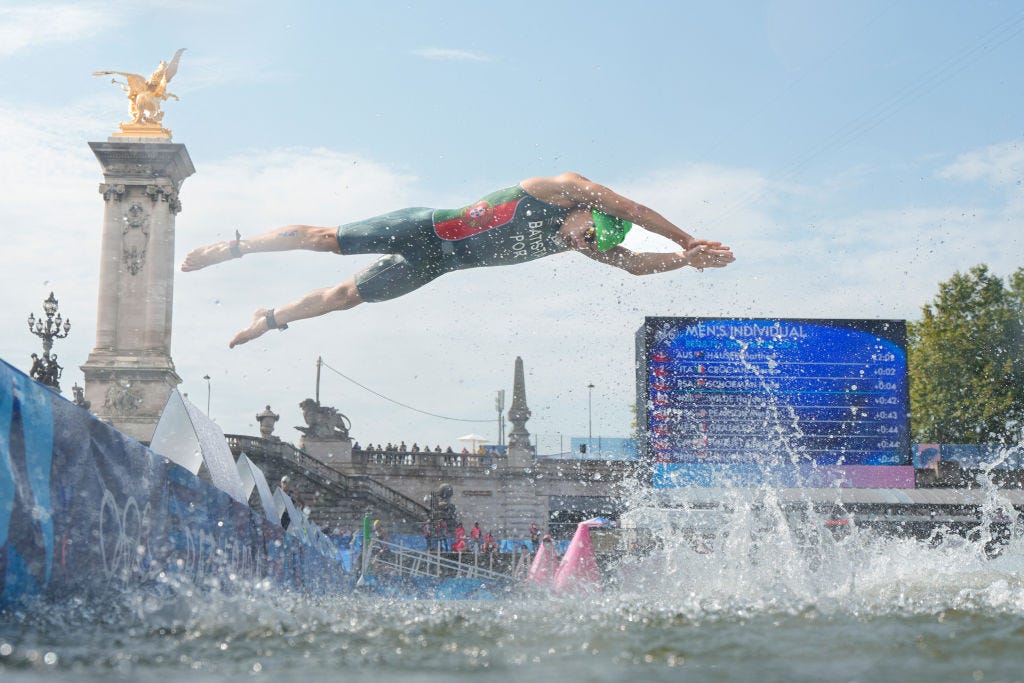
→ Water under the Pont Neuf: An emerging theme of Paris 2024? Burying the hatchet. Dawn Staley, coach of the South Carolina Gamecocks women’s basketball team and sitting member of the U.S. women’s basketball selection committee, said that if selections were today, she’d consider letting Caitlin Clark onto the team. The omission of Clark was big news—and in the eyes of some, a big own goal for the sport. “If we had to do it all over again, the way that she’s playing, she would be in really high consideration of making the team,” said Staley. This is four months after Staley’s team wiped the floor with Clark’s team, the Iowa Hawkeyes, in the National Championship.
Snoop Dogg, the rapper turned NBC correspondent, is also squashing his beef in Paris. While interviewing Simone Biles’ family, her mother confronted him about shrugging off a photo request in Times Square in 2010. Snoop laughed it off and offered the D.O.G.G. equivalent to an apology, pointing to an infant in Biles’ entourage: “Shout-out to the baby that’s frowning at me.”
What to watch today: At 7 a.m. EST, the U.S. men’s volleyball team, led by influencer-in-chief Erik Shoji, takes on Germany; at 12:15 p.m., Biles and co. will shoot for gold in the women’s gymnastics team final. And at 9:30 p.m., the final matchup of men’s surfing will go down in Tahiti.
And for some commercial-break reading: Get into the mathematics behind swimming, take a view on the outcry over the new, less skimpy volleyball uniforms, and read this profile of “the grand duchess of Luxembourg table tennis,” 61-year old Ni Xia Lian.
July 29
→ You win some, you lose some: The U.S. got off to a bit of a slow start this weekend, after China took home the first gold of the year in riflery Saturday morning. I try not to be an alarmist when it comes to China, but if America is losing the gun-shooting event, maybe we really are falling behind.
But nothing can stop America’s gymnasts. Simone Biles cemented her triumphant return, albeit with an injured calf, by qualifying for the medal round in every single event. She’ll be joined in the final by her teammate Suni Lee—who won the all-around gold in 2020—making Thursday the first time two former champs from the same squad will compete with each other in the all-around final.
Other winners: Phoenix Suns’ superstar Kevin Durant led the U.S. men’s basketball team in a 26-point blowout over Serbia. Female fencers Lauren Scruggs and Lee Kiefer competed in an all-American final with Kiefer taking home the gold. And after placing second in the qualifiers, 31-year-old swimming sensation and full-time engineer Nic Fink tied for second in a thrilling 100-meter breaststroke final, winning his long-overdue first Olympic medal and coming two-hundredths of a second away from gold.
→ City of Love: In big off-field news, Argentina’s Pablo Simonet, who plays handball, and Pilar Campoy, a hockey player, got engaged in the Olympic Village, surrounded by their teammates. But unlike the RNC, the Paris Olympics is firmly anti–hookup culture: the dating app Grindr disabled its location services in the Olympic village, citing safety concerns for LGBTQ athletes. Sensing a gap in the market, some of the more entrepreneurial athletes have set up a booming OnlyFans economy.
What to watch today: At 9:35 a.m. EST, join Flavor Flav in watching USA vs. Spain in women’s water polo; at 10 a.m., watch ex-NBA player Chase Budinger continue his epic beach volleyball run against France; and at 3 p.m., the American women’s basketball team (minus Caitlin Clark) get their Olympics underway against Japan.

→ Was the opening ceremony demonic or just cringe? The Olympic opening ceremony is an opportunity to showcase the best of the host country: their inventions and innovations, their proudest achievements and their physical prowess. Back in Beijing in 2008, China subbed in a cuter 7-year-old girl to lip-synch a song that was really being sung behind the curtain by a more talented 9-year-old because the older girl had crooked teeth. And you’re telling me the best France has to offer is a man with a beard twerking in a bustier?
Thomas Jolly, the choreographer responsible for this slopfest, told the AP, “My wish isn’t to be subversive, nor to mock or to shock. Most of all, I wanted to send a message of love, a message of inclusion and not at all to divide.”
But inclusion is not the point of the Olympics. Quite the opposite. Excellence is the point. Read Suzy Weiss’s full take on the opening ceremony that missed the point.


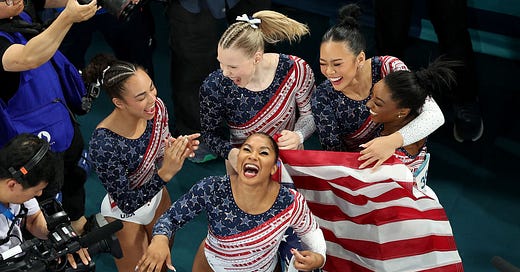



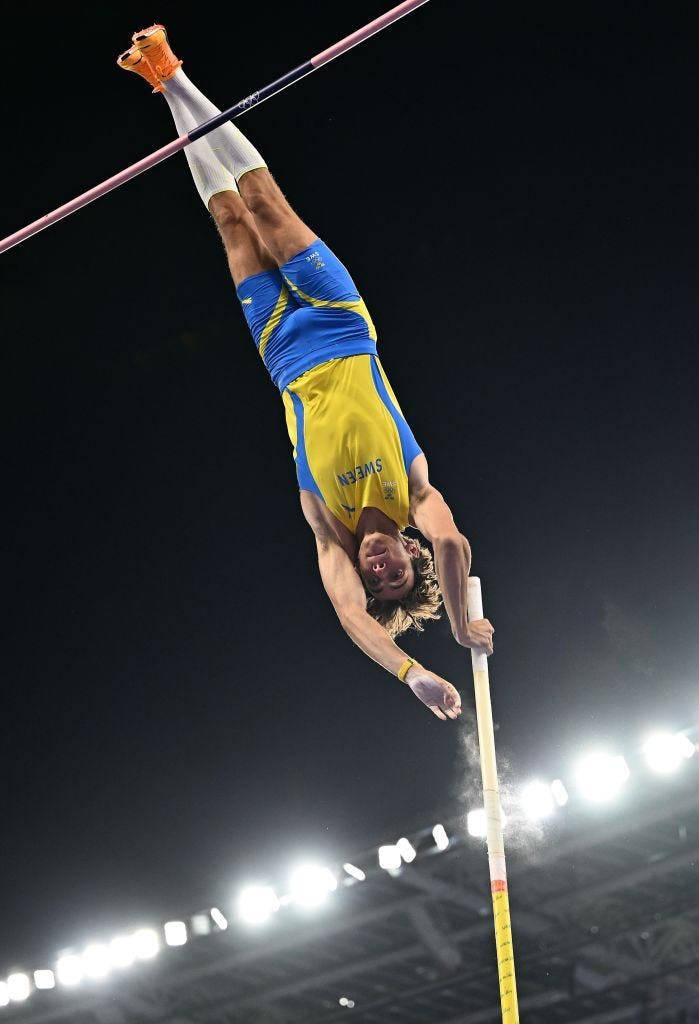




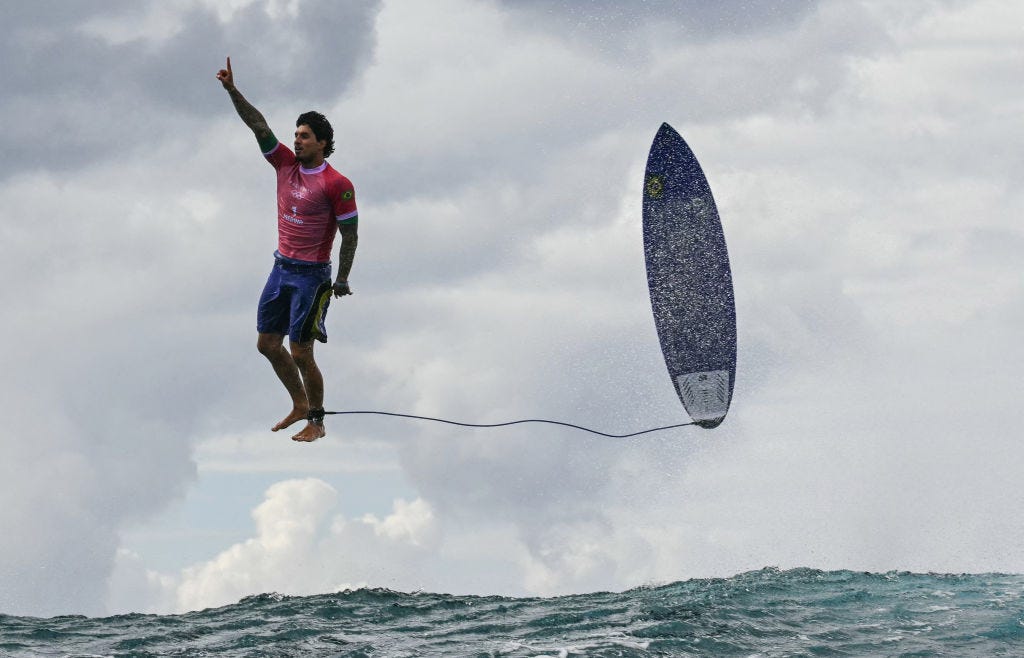
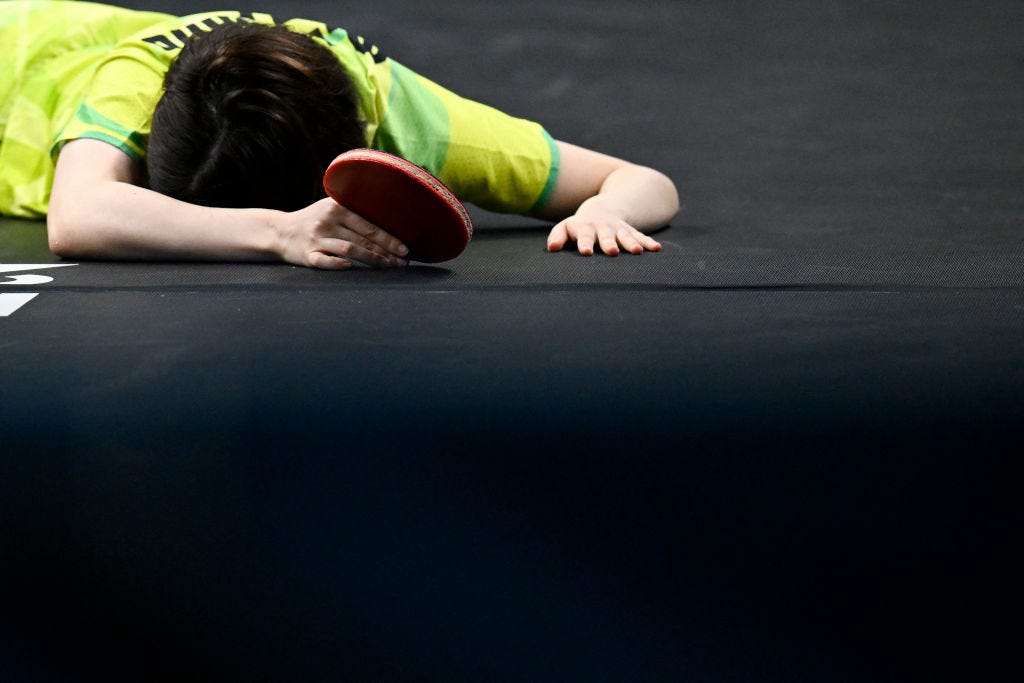














"The best way to keep up with our Olympics coverage is... telling me the best France has to offer is a man with a beard twerking in a bustier?"
That's the perfect summary, and about all I read in this piece. Thank you. The NFL Hall of Fame game is tomorrow.